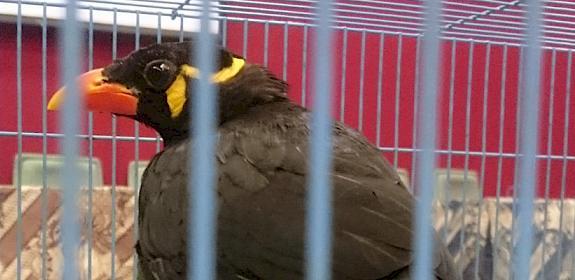Songbirds sunk—almost 300 birds drowned by smugglers in dramatic confiscation
Melaka, Malaysia, 18 January 2018—Smugglers dumped 300 birds into the sea on Tuesday while attempting to escape authorities, drowning most of the animals that were believed to have been collected in various Southeast Asian countries, for sale in Indonesia.
Malaysia’s Maritime Enforcement Agency (MMEA) officers intercepted a boat carrying three Indonesians in waters just off the coastline of Peninsular Malaysia. The three men were apprehended but authorities were not able save most birds; only three survived.
In a press statement shared with TRAFFIC, the MMEA said it believed the birds were smuggled over land from Viet Nam to Thailand, and then into Malaysia, which served as a transit point before the birds were to be smuggled into Indonesia for sale.
Some of the 300 birds thrown into the sea by smugglers as they attempted to escape pursuing authorities. The birds are believed to have been collected for sale in markets in Indonesia © Malaysian Maritime Enforcement AgencyThe case has been handed over to Peninsular Malaysia’s Wildlife and National Parks Department for further investigations under the Wildlife Conservation Act 2010. Authorities are working to identify all the birds, most of which are thought to be songbirds.
The MMEA, which is tasked with maintaining law and order and co-ordinating search and rescue operations in Malaysian waters, has previously stopped bird smugglers moving their contraband both to and from Indonesia.
In April 2016, its officers found 100 Oriental Magpie-robins on a boat which was also ferrying illegal immigrants from Indonesia. In 2015 it intercepted an Indonesian boat with 150 Oriental Magpie-robins headed for Malaysia and in 2013 it stopped an Indonesian national attempting to smuggle 10 cockatoos into Malaysia.
While Tuesday’s incident confirms the persistent illegal capture and smuggling of wild birds for trade in the region, it also raises questions about the source of birds observed in Indonesia’s thriving caged bird trade.
So popular is bird keeping as a hobby, traders are expanding their collection of commonly traded birds into other range States to supply Indonesia’s flourishing bird markets. Collaboration between countries is crucial to end this problem, or across Asia we will be left with silent forests.
Kanitha Krishnasamy, Acting Regional Director for TRAFFIC in Southeast AsiaIn September 2017, the European Association of Zoos and Aquaria (EAZA), together with TRAFFIC, BirdLife International and the IUCN Asian Songbird Trade Specialist Group, launched Silent Forest, a collaborative effort to save iconic Asian songbird species from extinction by raising awareness about the devastating effects of the trade in songbirds across Southeast Asia and funds conservation projects working to address the problem.

So great is the demand for caged birds within Indonesia that authorities regularly stop huge shipments of wild-caught birds trafficked between the nation’s many islands.
Just days ago, authorities at the Lembar Port in West Lombok stopped a truck stuffed with over 1,700 birds destined for Bali.
Among the birds were one Brahminy Kite, a protected species, and over a thousand Streaked Weavers. The birds were packed in plastic crates and cardboard boxes and found on a lorry during a routine vehicle inspection at Lembar Port. Many were dead or in poor condition when found.
It was the second such case for West Lombok enforcers in 2018. The first was a seizure of more than 2,000 wild-caught birds on 8 January that were being transported to Java and Bali, without the necessary permits and documents.
The West Nusa Tenggara Nature Conservation Agency, which was involved in both cases in January, also told Indonesian press that it foiled six more wildlife smuggling attempts in 2017 which resulted in the seizure of about 8,000 birds.
Excessive trapping for the caged bird trade has been identified as one of the major threats facing songbirds in Southeast Asia. Huge open markets selling millions of birds each year can be found throughout the region, but are particularly prominent in Indonesia, where birdkeeping is a widespread practice.
Previous TRAFFIC surveys have shown the phenomenal songbird trade in Indonesia’s markets—over 19,000 in three Jakarta markets over 3 days, and 22,911 in five markets in Central and East Java in 3 days.





